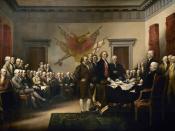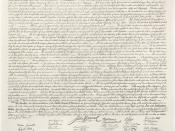Understanding Thomas JeffersonÃÂs attitudes and opinions on the Constitution proves much more difficult than those of the other founding fathers. JeffersonÃÂs political ideology combined with his career as a diplomat to create a complex struggle between his deep appreciation for a truly democratic society and the pragmatic needs for a strong central government able to function on the international stage. JeffersonÃÂs own writings often appear contradictory when he discusses his opinions regarding the Constitution and seem to differ based upon the intended recipient and date of composition. This combination of beliefs led to JeffersonÃÂs apprehension and tacit support of the Constitution.
The Declaration of Independence, written primarily by Thomas Jefferson, provides the clearest evidence of JeffersonÃÂs strict adherence and personal attachment to democratic principles, the same principles that would preclude his unabated support for the later Constitution. However, The Declaration of IndependenceÃÂs intent was solely political, but was also a masterful propaganda tool to raise support for the revolutionÃÂs success which was far from guaranteed.
To decipher JeffersonÃÂs true beliefs we must compare his statement in the Declaration of Independence and those made after the war or during the Constitutional ratification process.
The preamble to the Declaration provides us with the most obvious and inspiring statement about the equality of man and JeffersonÃÂs love of democratic principles. As inspiring as it may be, the statement ÃÂWe hold these truths to be self-evident, that all men are created equal, that they are endowed by their Creator with certain unalienable Rights, that among these are Life, Liberty and the pursuit of HappinessÃÂ is a masterful use of rhetoric and was certainly intended as literary propaganda meant as to rally support for the revolutionary cause. However, his belief in those principles is supported by his later writings. JeffersonÃÂs tacit approval of the...


